第65章 LETTER XII(5)
The betel-nut is the fruit of the lovely, graceful, slender-shafted areca palm. This tree at six years old begins to bear about one hundred nuts a year, which grow in clusters, each nut being about the size of a nutmeg, and covered with a yellow, fibrous husk. The requisites for chewing are: a small piece of areca nut, a leaf of the Sirih or betel pepper, a little moistened lime, and, if you wish to be very luxurious, a paste made of spices. The Sirih leaf was smeared with a little fine lime taken from a brass box; on this was laid a little, brownish paste; on this, a bit of the nut; the leaf was then folded neatly round its contents, and the men began to chew, and to spit--the inevitable consequence. The practice stains the teeth black. I tasted the nut, and found it pungent and astringent, not tempting. The Malays think you look like a beast if you have white teeth.
The heat was exhausting; the mercury 87 degrees in the shade as early as 8:30, and we all suffered, more or less, from it in our cramped position and enforced inactivity. At nine, having been fourteen hours on the river, we came on a small cleared space, from which a bronzed, frank-faced man, dressed in white linen, hallooed to us jovially, and we were soon warmly greeted by Captain Murray, the British Resident in the State of Sungei Ujong. On seeing him, we hoped to find a gharrie and to get some breakfast; and he helped us on shore, as if our hopes were to be realized, and dragged us under the broiling sun to a long shed, the quarters of a hundred Chinese coolies, who are making a road through the jungle. We sat down on one of the long matted platforms, which serve them for beds, and talked; but there was no hint of breakfast; and we soon learned that the Malacca runner had not reached the Residency at all, and that the note sent from Permatang Pasir, which should have been delivered at 1 A.M., had not been received till 8 A.M., so that Captain Murray had not been able to arrange for our transport, and had had barely time to ride down to meet us at such "full speed," as a swampy and partially made road would allow. So our dreams of breakfast ended in cups of stewed tea, given to us by a half-naked Chinaman, and, to our chagrin, we had to go back to the boat and be poled up the shallowing and narrowing river for four hours more, getting on with difficulty, the boat-men constantly jumping into the water to heave the boat off mud banks.
When we eventually landed at Nioto, a small village, Captain Murray again met us, and we found a road; and two antiquated buggies, sent by a Chinaman, with their component parts much lashed together with rope.
I charioteered one of these, with reins so short that I could only reach them by sitting on the edge of the seat, and a whip so short that I could not reach the pony with it. At a Chinese village some policemen brought us cocoa-nut milk. After that, the pony could not, or would not, go; and the Malay syce with difficulty got it along by dragging it, and we had to walk up every hill in the fierce heat of a tropic noon. At the large Chinese village of Rassa, a clever little Sumatra pony met us; and after passing through some roughish clearings, on which tapioca is being planted, we arrived here at 4 P.M., having traveled sixty miles in thirty-three hours.
The Residency is on a steepish hill in the middle of an open valley, partially cleared and much defaced by tin diggings. The Chinese town of Serambang lies at the foot of the hill. The valley is nearly surrounded by richly wooded hills, some of them fully three thousand feet high.
These, which stretch away to the northern State of Selangor, are bathed in indigo and cobalt, slashed with white here and there, where cool streams dash over forest-shaded ledges. The house consists of two attap roofed bungalows, united by their upper verandas. Below there are a garden of acclimatization and a lawn, on which the Resident instructs the bright little daughter of the Datu Klana in lawn tennis. It was very hot, but the afternoon airs were strong enough to lift the British ensign out of its heavy folds and to rustle the graceful fronds of the areca palms.
Food was the first necessity, then baths, then sleep, then dinner at 7:30, and then ten hours more sleep.
I. L. B.